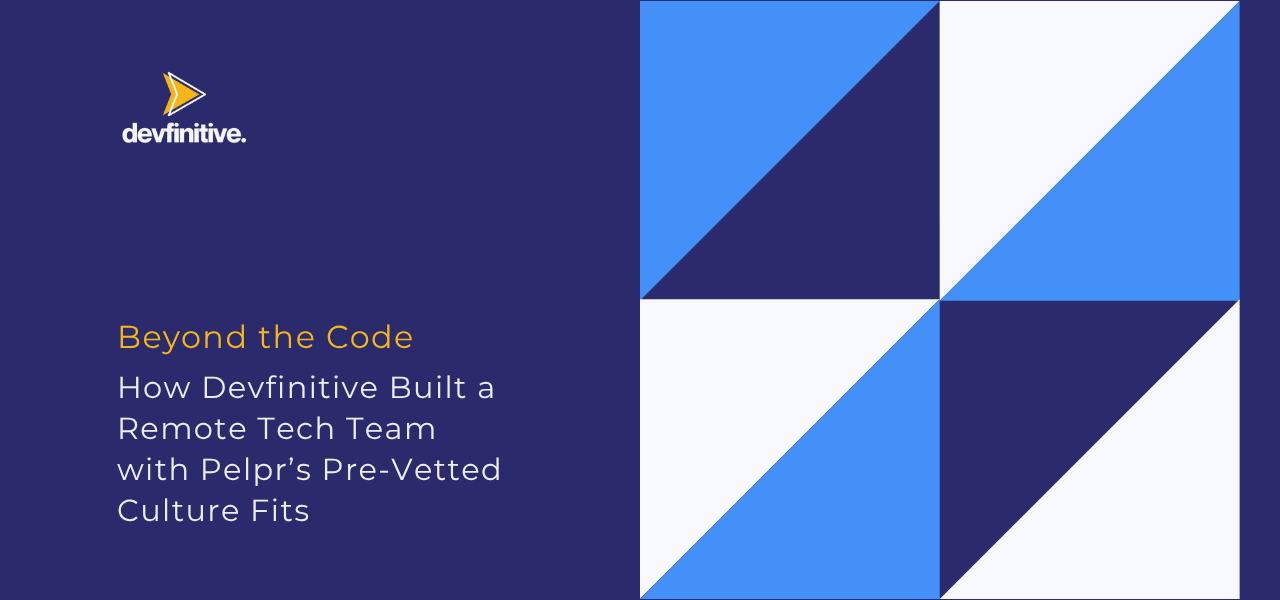Insights on Hiring, Engineering Teams, and Remote Work
How Devfinitive Built a Remote Tech Team with Pelpr’s Pre-Vetted Culture Fits
Pelpr
- 5 mins read - September 25, 2025

Introduction: The Wrong Puzzle Pieces Don’t Make the Picture
When Devfinitive first shifted to a remote-first strategy, they imagined it would be like plugging elite developers into Slack and watching magic happen. But six months in, the dream team looked more like a glitchy Zoom call than a high-output engine.
Deadlines slipped. Morale dipped. Slack was silent.
They had hired for skill.
They hadn’t hired for fit.
That’s when they found Pelpr — not just a hiring platform, but a matchmaking engine for tech culture.
Chapter 1: The Culture Crash
Devfinitive’s pivot to remote came with good intentions. Reduce overhead. Expand the talent pool. Stay competitive. They posted jobs. Dozens of applicants poured in. Resumes were pristine. GitHub repos sparkled. But after onboarding…
A senior engineer ghosted stand-ups after week two.
A designer refused Figma comments “on principle.”
A backend dev said, “Agile is a suggestion, not a law.”
Skill-wise, these were top performers. But collaboration felt like herding cats — each one elite, none aligned.
“We realized we weren’t hiring a team. We were assembling a collection of freelancers,” said their Head of Engineering.
They needed more than coders. They needed culture carriers.
Chapter 2: Enter Pelpr — The Cultural Algorithm
Pelpr wasn’t just another platform with a database of devs. Their pitch?
“We don’t just pre-vet for skills. We pre-vet for culture compatibility.”
Here’s how:
✅ Behavioural Matching: Candidates complete a nuanced profile — async vs sync preferences, feedback style, time zone comfort, leadership attitude.
✅ Human-Curated Vibes Check: Beyond algorithms, real humans assess how a candidate communicates and collaborates during vetting simulations.
✅ Cohesion Index: A metric Pelpr created to quantify how well a new hire will vibe with your existing team’s dynamics.
Chapter 3: The Reboot — Culture, Now With Code
Devfinitive onboarded four new team members via Pelpr over three months. The difference was immediate:
Stand-ups turned into strategy huddles.
Designers and engineers collaborated without friction.
Time zones became less of a burden because everyone had the same async muscle memory.
The new hires weren’t just “good at their jobs.” They understood the why behind Devfinitive’s mission. They pushed product ideas. They contributed to team rituals. One even launched a “no-meeting Fridays” productivity hack that’s now policy.
Chapter 4: The Results — Not Just a Vibe, a Victory
Let’s talk numbers:
📉 -40% turnover in their remote tech team
⏱ 2.5x faster time-to-productivity
🎯 100% of Pelpr hires hit their 6-month KPIs
❤ 0 ghostings, no Zoom fatigue
Devfinitive didn’t just fix their hiring. They built a remote culture with superglue baked in.
Conclusion: The Next Frontier Isn’t Technical. It’s Tribal.
As remote work becomes the norm, companies obsessed with technical prowess alone will fall behind. What’s needed are cultural architects — people who write great code and contribute to the soul of a team.
Pelpr gets this.
“We don’t just fill roles,” said their CEO. “We build remote tribes.”
Want a Remote Team That Feels In-Office Tight?
Start with pre-vetted culture fits.